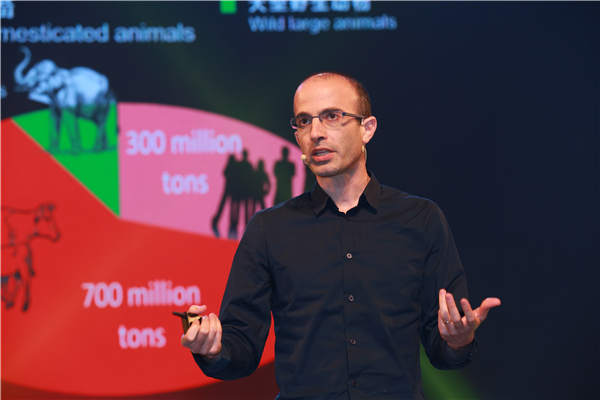 |
|
Yuval Noah Harari shares with Chinese readers his insight into human evolution during his book tour in Beijing. |
Harari set out to write a history book for general readers but was turned down by five publishers in Israel.
The book dwells on human history over 2 million years, covering three key revolutions (cognitive, agricultural and scientific) and one phase of human unification.
Finally published in Hebrew in 2011, and in English in 2014, it won China's Wenjin Book Award from the National Library for best book of that year.
To cover 2 million years in no more than 500 pages, Harari engages and connects ideas from biology, archaeology, politics, economy, genetics and AI studies.
"History is complicated. To really understand, you need to look at it from many angles at the same time and use multiple measurements," says Harari.
He also devotes one chapter to the subject of happiness, arguing that we're not happier than our ancestors, as we're filled with more desires.
He says historians seldom look at people's inner desire for happiness, especially viewing from the long run of history. But his ideas have resonated with the Chinese readers' need for "chicken soup" and soul exploration.
"People don't make the most of the opportunities that their jobs offer them," he adds.
Harari specialized in medieval history and military history.
But with experience and a secure professional position, he began to be bolder and try to look at the bigger questions.
"The more you understand reality and your place in it, you can be much more calm and peaceful," he says, adding his hobbies include walking in the woods and two hours of meditation every day.
His next book, History of Tomorrow, will be available in English soon and in Chinese, too.
Shu says Harari shows readers an exciting path, adding that Chinese audiences are willing to pay for getting new knowledge via authors' shows.
Born in 1976 in a Jewish family to an engineer father and secretary mother, Harari received his PhD from the University of Oxford in 2002 at age 26.
"I was curious about big questions on why the world is the way it is and the deep forces that shape reality and our life, but didn't get satisfied with answers when young from parents and teachers. They seemed to be not interested in these questions," he says.
"Most people when young ask those big questions, but by 20-something, they put these questions aside, and think about practical issues." he says.
"In my case, I just did not do that and they continued to be very central for me, from 14 to now."